Patagonia Fitz Roy 30 F/-1 C review: warm embrace
Sustainability champion Patagonia’s 3-season sleeping bag offers a lot of warmth in a super lightweight package
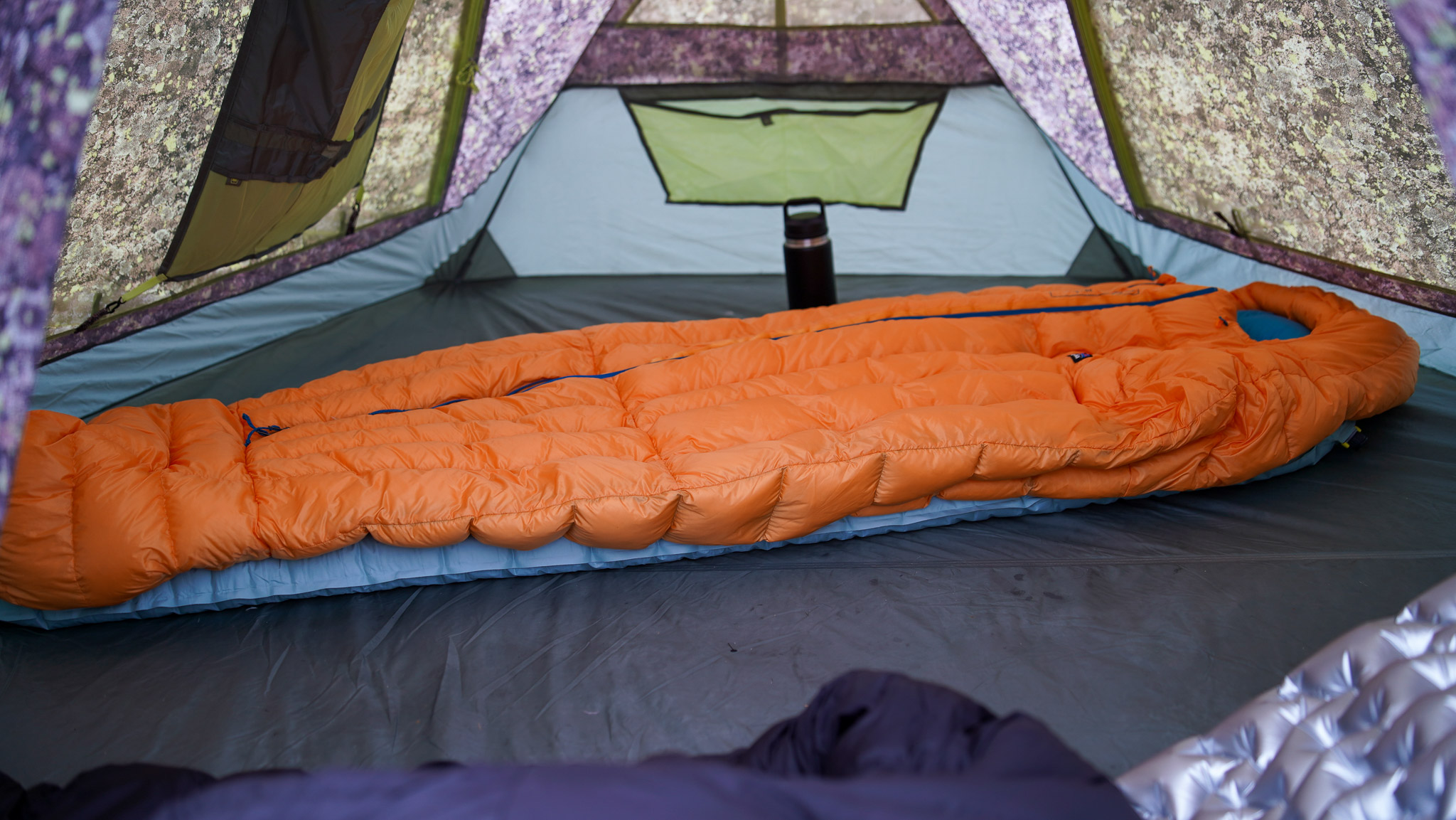
The Patagonia Fitz Roy 30 F/-1 C sleeping bag combines sustainability with comfort, featuring 100% recycled, solution-dyed fabric and ethically sourced 800-fill goose down. Its unique baffle construction ensures warmth, while its lightweight design and spacious fit make it ideal for three-season camping. An awesome 3-season sack for for affluent campers.
-
+
Lightweight construction
-
+
Sustainable materials used
-
+
Quiet and cosy
-
+
Spacious inside
-
-
Some cold spots
-
-
Adjustable hood would be nice
Why you can trust T3

It might just be me, but I was surprised to find that Patagonia not only makes sleeping bags but is also pretty well-designed. To be honest, this shouldn’t come as a surprise, as the brand is famous for making clothes that last, so surely, the Fitz Roy 30 F/-1 C should be durable, too.
What captivated me about the Patagonia Fitz Roy 30 F/-1 C was its blend of lightweight construction, 3-season adaptability, and eco-friendly materials. These elements combine to create a cocoon of comfort and warmth, making this lightweight sleeping bag one of the top choices for those seeking a cosy sleep system. It even compresses down to a small size, perfect for backpacking.
As expected from Patagonia, the Fitz Roy 30 F/-1 C is a high-quality product that comes with a price tag. However, this investment is one that will pay off in the long run, as the sleeping bag is designed to withstand the rigours of outdoor adventures. The 800-fill-power-down insulation ensures you stay warm even during early spring or late autumn hikes. So, should you get one? Absolutely, if you value performance and durability in your outdoor gear.
Patagonia Fitz Roy 30 F/-1 C review
Price and availability
The Patagonia Fitz Roy 30 F/-1 C is available to buy now directly from Patagonia US and Patagonia UK with prices from $400/ £400. The bag comes in three sizes, small, regular and long, small being the cheapest and long the most expensive. It comes in one colour only (Mango).
Patagonia also sells another Fitz Roy Down Sleeping Bag that goes down to 20°F / -7°C (prices from $499, Patagonia). This is more expensive and uses an 800-fill-power down. It comes in one colour only, too: Steller Blue.
I tested the long version as I’m 6’0” (the height limit for the long version is 6'6").
Specifications
- Weight: 794 g/ 28 oz (short), 822 g/ 29 oz (regular), 838 g/ 30 oz (long)
- Temperature: 30 F/-1 C
- Filling: 800-fill-power Advanced Global Traceable Down
- Shape: mummy
- Pack size: 19 x 26 cm/ 7.5 x 10 in.
Design and materials
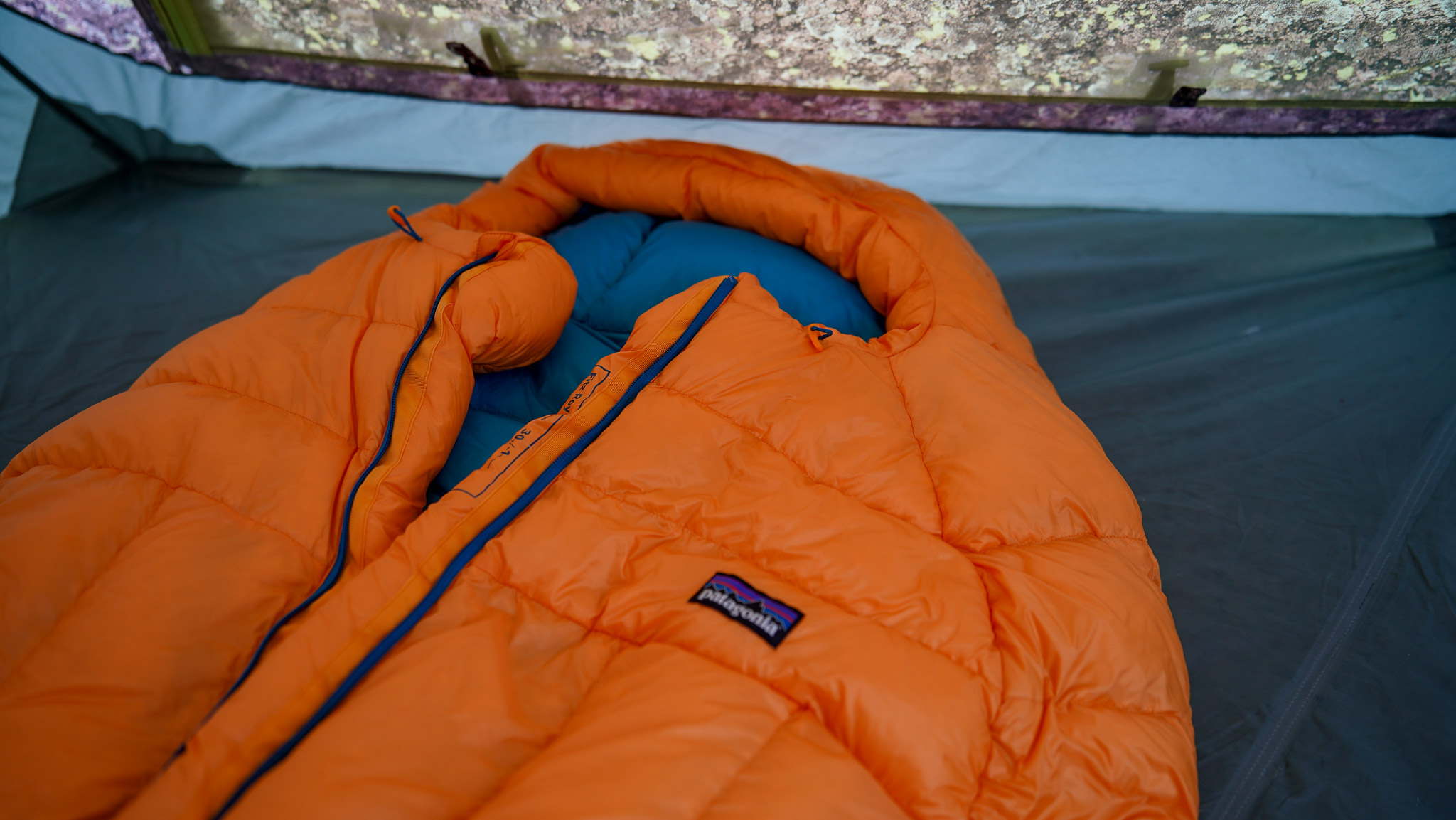
As expected, the Fitz Roy 30 F/-1 C is made with sustainability and traceability in mind. The cover is from 100% recycled and solution-dyed, 1.1-oz 20-denier ripstop fabrics with a durable water-repellent (DWR) finish made without perfluorinated chemicals (PFCs/PFAS).
The 800-fill-power goose-down filling is equally environmentally friendly. Patagonia says it’s certified by NSF International to ensure the birds that supply it are not force-fed or live-plucked.
The baffle construction is unique in that there are vertical and horizontal baffles in different areas of the sack. There are horizontal baffles all along the back, the foot box, and the upper chest/shoulders, while vertical baffles cover the front of the body. There are also extra baffles under the zipper to keep the cold out.
Made in a Fair Trade Certified factory in Vietnam, the tested long version weighs only 838g, which is super lightweight for a 3-season sack. Better still, its standard fit means the Fitz Roy 30 F/-1 C is quite roomy inside and has a large ‘3D-engineered’ hood and sculpted foot box.
There’s a zippered internal chest pocket, which is a nice touch these days when all hikers and campers carry smartphones. Three YKK zippers ensure you can effectively manage the temperature inside the Fitz Roy 30 F/-1 C.
One final note on the colour. Although Patagonia doesn’t advertise it that way, the Mango-coloured Fitz Roy 30 F/-1 C would certainly be easier to notice in the snow or foliage than a green or blue sleeping bag, should you need assistance. Of course, if the bag is inside a dark green backpacking tent in the forest, this won’t help much, but still.
Performance and comfort
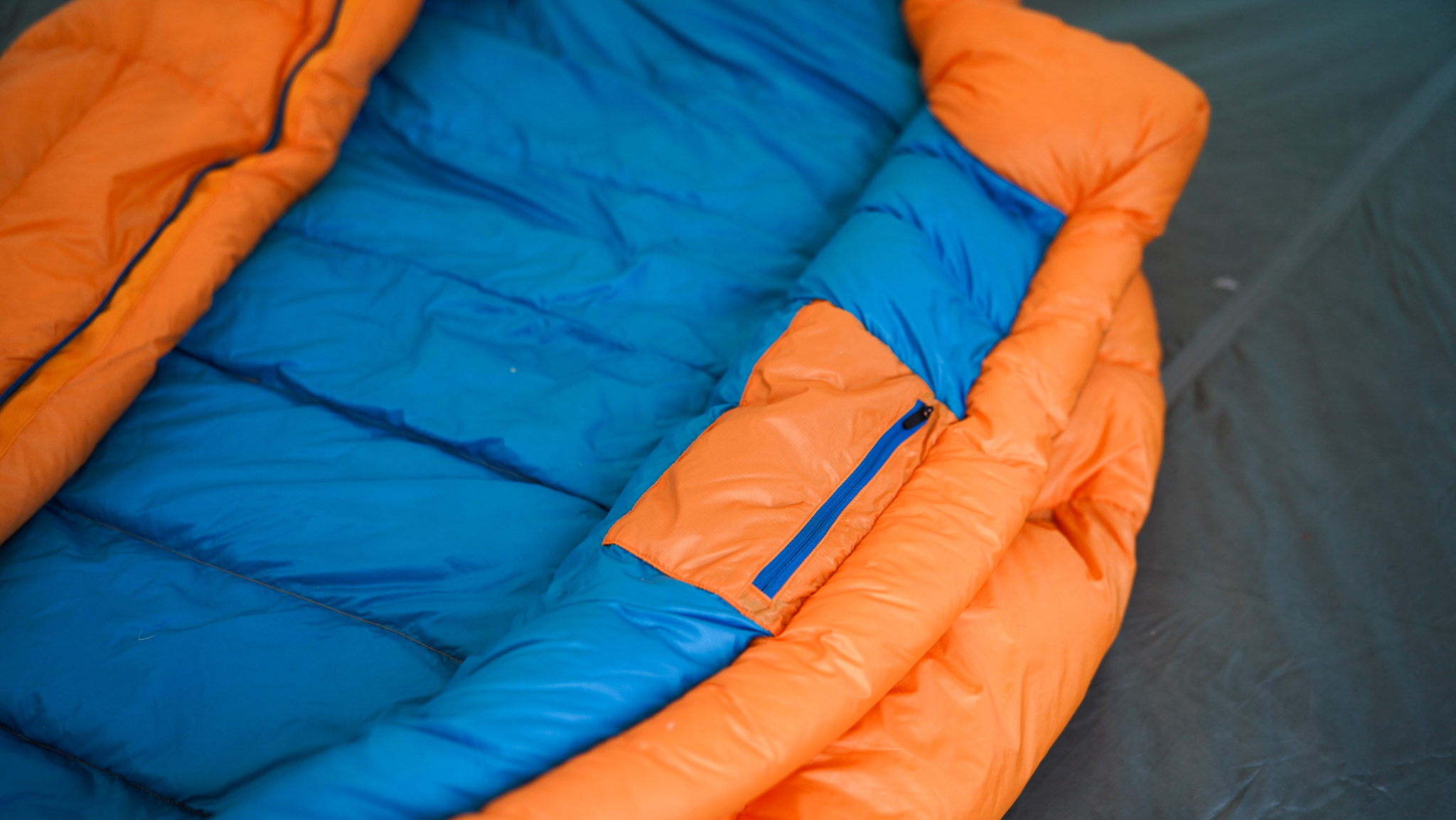
First and foremost, sleeping bags need to be comfortable, and the Patagonia Fitz Roy 30 F/-1 C review easily ticks that box. The fabric covering the sack is soft to the touch and makes little sound; it certainly isn’t crinkly or slippery like some of the other synthetic sleeping bags I tried.
The foot box is another standout feature. The shape is perfect – not too baggy or tight – and I found it to provide the right temperature for sleeping. I started testing the Fitz Roy 30 F/-1 C in early March and continued to do so into early May, with temperatures occasionally going down to 5°C (41°F). I used the Vango Aotrom Thermo Platinum for support.
As a side sleeper, I tend to wiggle quite a bit when I sleep. And when I did while inside the Fitz Roy 30 F/-1 C, I sometimes felt the cold around my hips as I turned. I probably should’ve turned with the sleeping bag, if that makes sense, but instead, I rotated my body with the sleeping bag facing up.
As a result, my semi-foetal position stretched the baffles in the midsection of the sack, exposing my body to the cooler outside world more. Nothing a good base layer couldn’t handle, but I did think a little more down would’ve made the bag more comfortable.
This reminds me: the Fitz Roy 30 F/-1 C only has one temperature rating, which I assumed was the comfort rating (see also: Why do sleeping bags have three different temperature ratings?).
It would’ve also been great if the hood was adjustable to keep the draft out. Plus, I found the zipper pulls to always be in my face when I was in the sleeping bag. There is a chin protector, so at least the YKK zippers aren’t in the way.
Another feature I would have liked is loops to keep the sack on top of the camping mats. I find it somewhat strange not to add them, as they make zero difference in weight and complexity, yet make all the difference if you’re a side sleeper like I am (see also: Therm-a-Rest Polar Ranger review).
Verdict
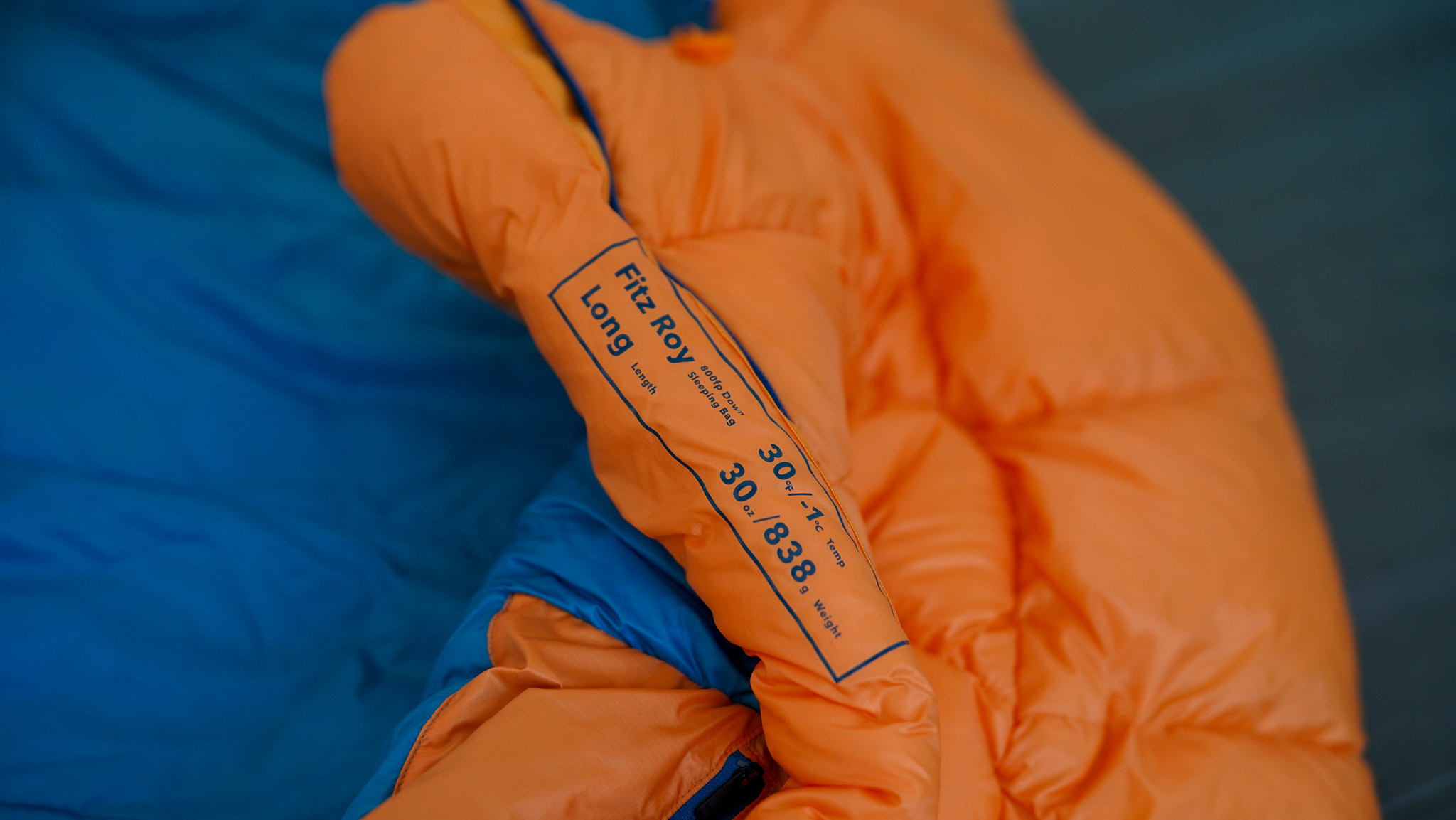
I’d recommend the Patagonia Fitz Roy 30 F/-1 C for everyone looking for a reliable, comfortable 3-season sleeping bag for camping. It’s excellent value for money, not in the sense that it’s cheap, but because it’s made responsibly using high-quality materials. You won’t need to replace it anytime soon, that’s for sure.
(Plus, even if it gets damaged, Patagonia has a solid repair scheme that will sort things out quickly.)
The Fitz Roy 30 F/-1 C isn’t perfect, though – some of the convenience features that I’d expect from a lightweight sleeping in this price category are missing. Even so, it’s hard not to fall in love with the sack, as it’s just so comfortable and bright (I heart the mango colourway). If you happen to come across one in a sale, give the Fitz Roy 30 F/-1 C a try.
Sign up to the T3 newsletter for smarter living straight to your inbox
Get all the latest news, reviews, deals and buying guides on gorgeous tech, home and active products from the T3 experts

Matt Kollat is a journalist and content creator who works for T3.com and its magazine counterpart as an Active Editor. His areas of expertise include wearables, drones, fitness equipment, nutrition and outdoor gear. He joined T3 in 2019. His byline appears in several publications, including Techradar and Fit&Well, and more. Matt also collaborated with other content creators (e.g. Garage Gym Reviews) and judged many awards, such as the European Specialist Sports Nutrition Alliance's ESSNawards. When he isn't working out, running or cycling, you'll find him roaming the countryside and trying out new podcasting and content creation equipment.
-
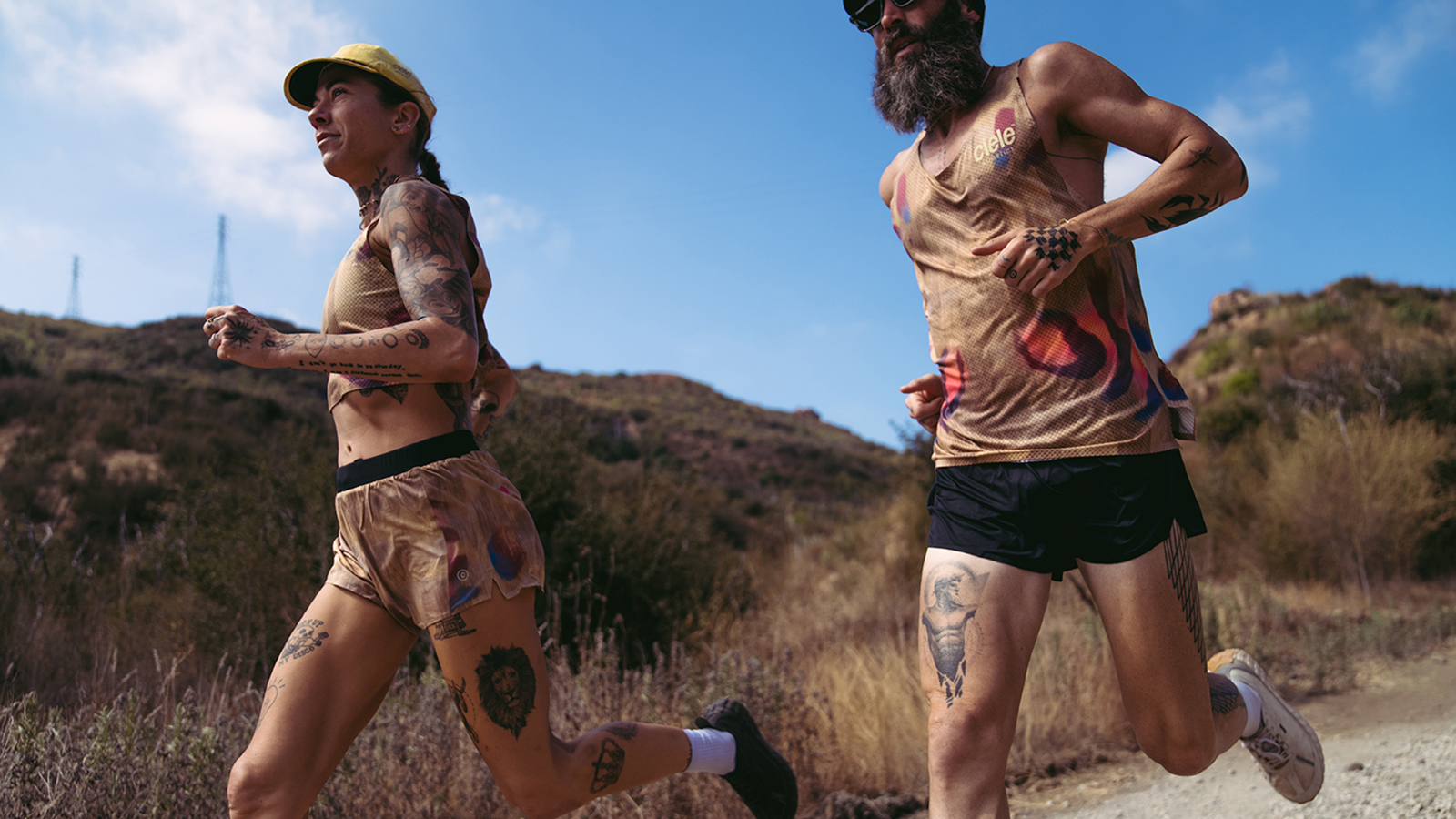 Warning: Ciele’s refreshed Elite Collection may cause excessive garment envy on race day
Warning: Ciele’s refreshed Elite Collection may cause excessive garment envy on race dayFlex on your run crew with Ciele’s latest drop
By Matt Kollat Published
-
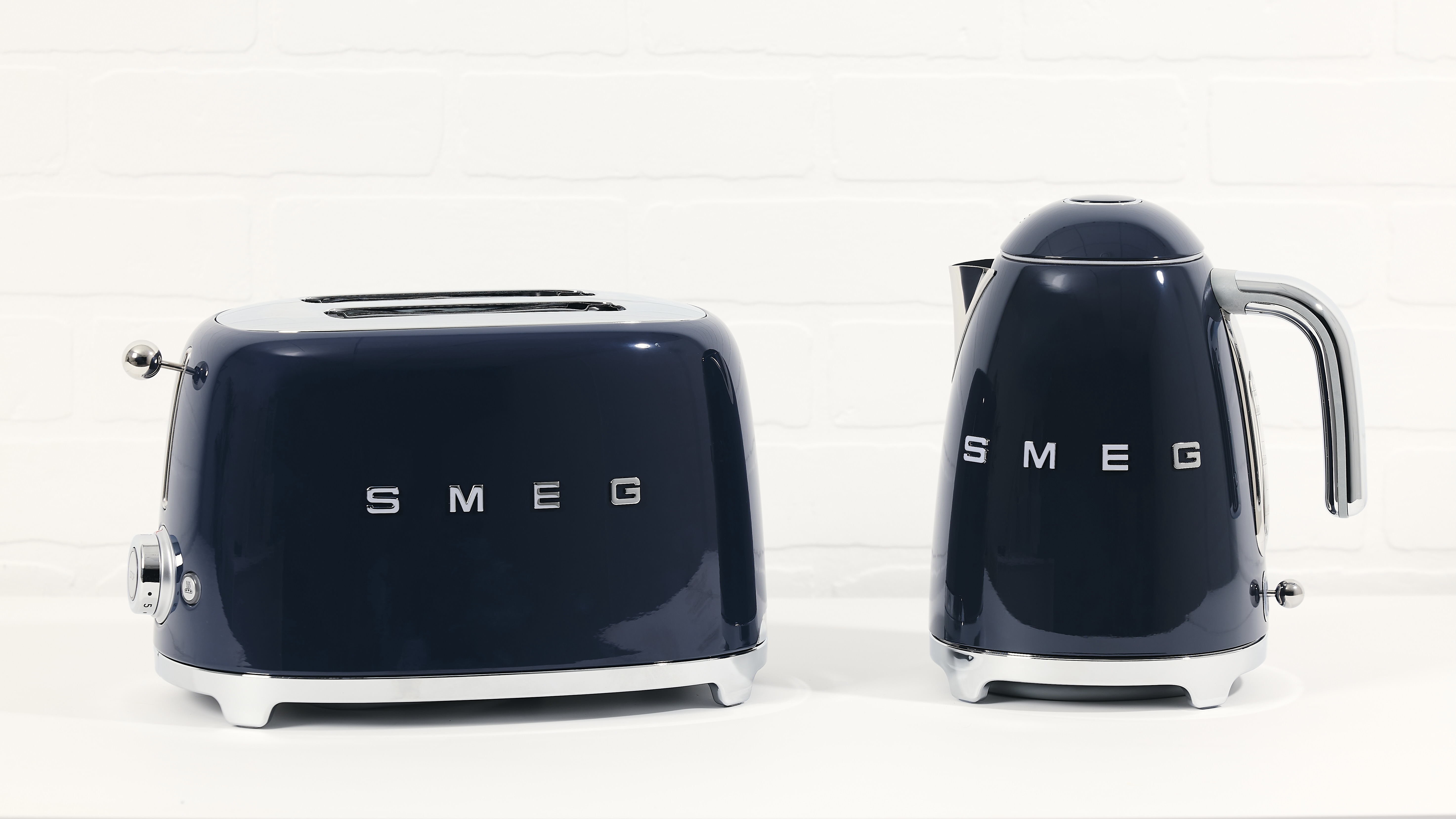 Smeg adds a touch of navy sophistication to its iconic breakfast set
Smeg adds a touch of navy sophistication to its iconic breakfast setIt's a minimalist's dream
By Lizzie Wilmot Published
-
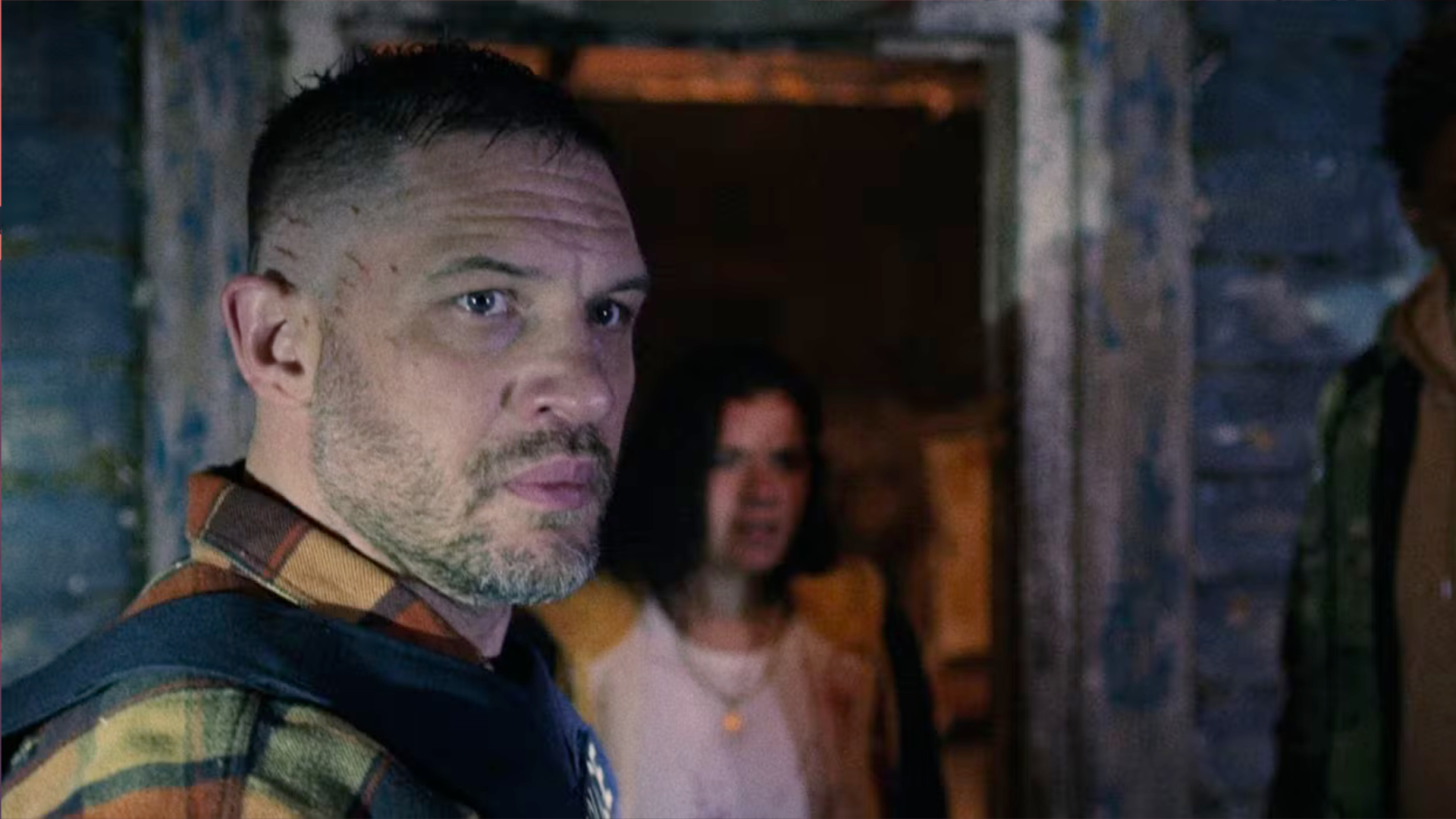 My most anticipated Netflix movie of the year gets a wild new trailer
My most anticipated Netflix movie of the year gets a wild new trailerHavoc looks pretty unbelievable
By Max Freeman-Mills Published